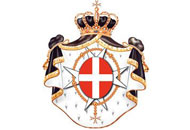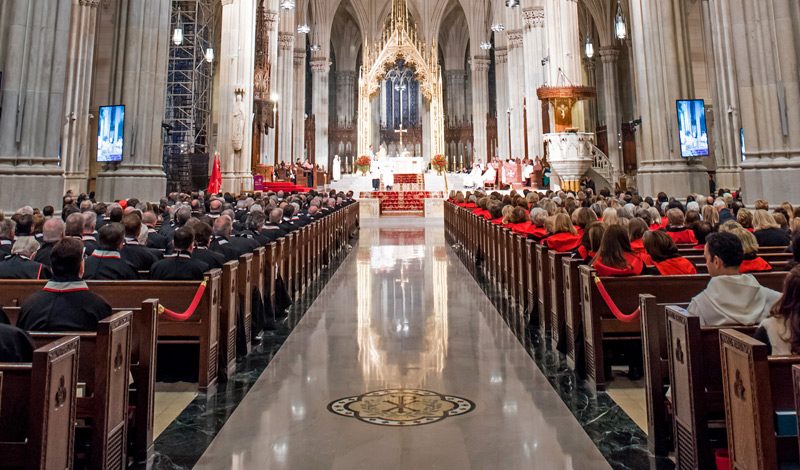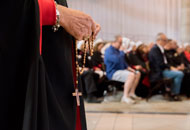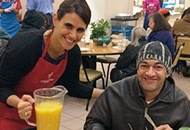By Very Rev. Anthony M. Barratt STL, PhD, EV, ChM
This weekend, we keep another great feast, that of Pentecost, when we remember the coming of the Holy Spirit upon the Apostles. Fifty days ago we celebrated Easter and during that time we have been hearing about the risen Jesus’s appearances to his disciples. The risen Jesus has now returned to the Father (as we celebrated on the Ascension of the Lord). Now Jesus fulfills his earlier promise that “the Advocate, the Holy Spirit” will be sent to the disciples (see today’s alternative Gospel, John 15: 26-27, 16: 12-15). The feast of Pentecost concludes the fifty days of our season of Easter. In fact, the word “Pentecost” comes from an ancient Greek word “pente-koste”, meaning fifty days. Well, all of this is fine and good, but what exactly do we celebrate today? Fortunately, our readings, both for the Vigil Mass and for the day, give us a rich kaleidoscope of images.
Before we delve into the rich content of the liturgy for Pentecost, we should look at some of the images of the Holy Spirit in our Tradition. In the Creed, we speak of the Holy Spirit as the “Lord and giver of life.” The Holy Spirit indeed brings life, sustains life and renews life: “Lord, send forth your Spirit and renew the face of the earth.” Furthermore, at creation, Adam and Eve needed God to breath his Spirit into them before they became true and living beings (Genesis 2: 7). The Holy Spirit is also associated with anointing and the “oil of gladness,” or that “sweet anointing from above.” Anointing is a sign of designation or choice: we are designated and chosen to go and bear fruit and it is the Holy Spirit who gives us the necessary gifts to do this. The Holy Spirit also enlightens and inspires. In other words, the Holy Spirit “in our souls takes His rest” and so becomes like a “grammar” that helps us to understand our calling and then enables us to live that calling.
The Holy Spirit is also the “bond of love” between the Father and the Son. For us, the Holy Spirit therefore draws and brings us into that communion, helping us to overcome divisions and to be instruments of unity. The Holy Spirit is often depicted as a dove: a symbol of peace or comfort yes, but also of mission. Interestingly, in some traditions, the Holy Spirit is seen as a wild goose! Not exactly as a wild goose chase, but rather as a sign that the Spirit has a freedom, and will take us here, there and everywhere: whatever, wherever God wills. In a similar vein, the Holy Spirit is also depicted as a powerful wind (the breath of God) that blows where it wills and, though invisible, its effects can be clearly seen. Finally, the Holy Spirit is seen as “fire.” Fire brings warmth and light and also purifies: may this be so for us.
Focusing on the feast of Pentecost, we can note that like so many of our feast days and prayers, it actually has its roots in a Jewish celebration, namely that of the “first fruits” or “the weeks”. This important feast was celebrated some seven weeks after the Sabbath of the Passover. It was a time to give thanks to God for the first fruits of the spring harvest and so to renew the covenant or relationship between God and His people. This gives a clue to much of what we celebrate today; especially if we look again at our readings, hymns and prayers at the Mass for Pentecost.
On the day of Pentecost, the apostles were renewed and, in fact, radically changed, in their relationship with God. Before the Holy Spirit came upon them, they were weak and frightened men, cowering in the upper room in fear (as we are told at the beginning of our First Reading in Acts 2: 1-11). After they had received the Holy Spirit they were strengthened and became bold and powerful witnesses to the risen Jesus. In this sense, Pentecost is called “the birthday of the Church.” They received not the first fruits of the spring harvest, but rather the fruits or gifts of the Holy Spirit: wisdom and understanding, right judgment and courage, knowledge and reverence, wonder or awe. This giving of the gifts of the Holy Spirit is continued in the Church through every generation and place seen, above all, in the sacrament of Confirmation.
The Gospel additionally tells us that the apostles also received the authority to become special instruments of God’s love and mercy, as the Holy Spirit is breathed upon them (John 20: 19-23). This gift continues in the Church, for example, through the sacrament of ordination. Those who are to be ordained are literally ordered (that is both changed in their very being and also commanded) to be ministers of that same love and mercy, through their leadership, their teaching and preaching and through the celebration of the sacraments. All of us though, receive the Holy Spirit. In these different and often difficult times, hopefully, we too have felt that presence of the Holy Spirit and all the wonderful gifts that Holy Spirit can give to us.
This radical renewal of relationships extends even further. We can notice, for example, how when Peter preaches on the day of Pentecost, each person present understands him in his or her own language (Acts 2 1-11). In other words, the division that can be caused by all the different languages spoken in our world (as we hear in the story of the Tower of Babel in Genesis 11: 1-9; First Reading at the Vigil Mass) is now overcome by the one message and one language of Jesus Christ: a language of love. After all, the Holy Spirit is often called the “bond of love” or the “Spirit of unity”. As St. Paul tells us in the Second Reading (1 Corinthians 12: 3b-7, 12-13), this unity is seen in a unity of action: there are many diverse gifts, but the same Spirit. So, today, with this wonderful feast of Pentecost, we also celebrate the unity that following Jesus and having faith in him can bring. We are indeed one family, brothers and sisters, in Jesus Christ.
As our season of Easter comes to its close, let us give thanks for the first fruits or the gifts of the Holy Spirit that we have received. It is a good time to renew our appreciation of those seven gifts of the Holy Spirit and to see how these gifts are very practical. They really do help us in our everyday life. Each day, why not think about one of the seven gifts of the Holy Spirit and see how this gift is working in your life. Also let us realize, once again, that these gifts are given to us to be shared with others. All of us have received that mission, or even commission, to preach the Gospel. Yes, we are disciples, but we are also disciple-makers. We often do this simply by trying to live and to witness to our faith in the everyday events and encounters that make up our daily life. Let us not cower in some upper room, but rather, like the apostles at Pentecost, boldly go out and witness to our faith.
The last words should be left to St. Basil the Great. In his great treatise, On the Holy Spirit, written 1650 years ago, he speaks of the gifts or graces of the Holy Spirit.
“This grace enables them [us] to foresee the future, to understand mysteries, to grasp hidden things, to receive spiritual blessings, to have their thoughts fixed on heavenly things, and to dance with the angels. So, their joy is unending, so is their perseverance in God unfailing, so do they acquire likeness to God, so-most sublime of all-do they themselves become divine.”
Let us then dance with the angels in and through the Holy Spirit!





